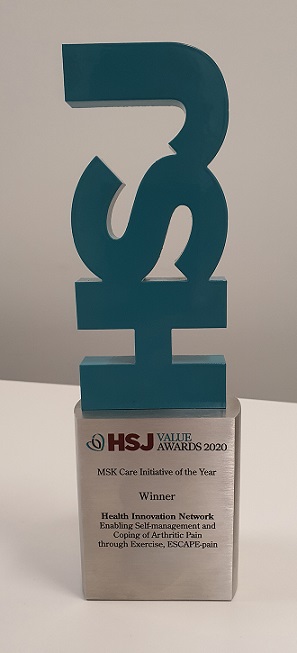Pioneering pain rehabilitation programme scoops esteemed health award
Published: 12 October 2020
A hip and knee pain rehabilitation programme that was created by a professor from St George’s, University of London and Kingston University has picked up a prestigious Health Service Journal award.
The ESCAPE-pain rehabilitation programme, launched by Professor of Rehabilitation Sciences Mike Hurley, landed the Musculoskeletal Care Initiative of the Year in the Health Service Journal Awards, which celebrate healthcare service excellence in the UK and initiatives that improve patient outcomes.
The programme, which involves an education component and an exercise regimen, has so far benefited around 20,000 people with osteoarthritis and saved the NHS an estimated £30 million by minimising the amount of healthcare needed by patients, while also reducing waiting times in the health service.
The award, in the Clinical and Medical Services category, is the latest in a string of accolades ESCAPE-pain has collected after previously being presented with the Royal Society of Public Health's Health and Wellbeing Award and UK Active's Specialist Training Programme of the Year Award.

Professor Hurley shared that his team usually celebrates award success at a glitzy ceremony – but not this time. “Normally there’s a big night when the awards are given out but, due to the pandemic, the event was cancelled and instead the winners were announced on Twitter,” Professor Hurley said. “I tuned in and waited for the tweet – it was actually very exciting and nerve-racking. I was very proud that the team’s hard work in helping so many people has been recognised,” he added.
ESCAPE stands for Enabling Self-management and Coping with Arthritic Pain using Exercise. The scheme, first piloted across South London and North Kent, was launched to address the care of more than 8.5 million patients who suffer from chronic joint pain across the United Kingdom. Its success has seen it heralded in the 10-year long term plan by the NHS as a solution to cut waiting times in hospitals and GP surgeries, and reduce waiting lists.
It was designed to help people with osteoarthritis – the most common form of arthritis – understand their condition better, realise that exercise is a safe and effective self-management strategy to reduce hip and knee pain, and recognise the physical and psychosocial effects of joint pain.
Part of the programme, which has been endorsed by organisations including NHS England, Public Health England and the charity Versus Arthritis, involves classes for groups of 10-12 people with osteoarthritis which have been delivered in almost 300 sites across the UK, including community centres, leisure centres and schools. This was, however, impacted by the coronavirus pandemic as all face-to-face classes had to stop – something which Professor Hurley admits felt devastating.
“The pandemic has been really difficult as we had to stop everything and I was concerned about the physical and social impact this could have on those taking part in the programme,” he said.
“We worked with NHS England and the Chartered Society of Physiotherapy, among others, to give people simple information about exercises they could do at home to stay active, while we also made our app and online versions of the programme more accessible and some sites even delivered the programme through Zoom – to varying degrees of success and stress.”
The programme is continuing to be delivered virtually while the pandemic is ongoing and could be developed further to help people with back pain. “We’re hoping to rollout ESCAPE-pain for backs over the coming year – providing we keep receiving the funding the scheme needs. We are looking at ways to sustain the programme so we can carry on helping thousands of people who are in need,” Professor Hurley said.
Find out more about studying rehabilitation sciences at St George's, University of London and Kingston University.